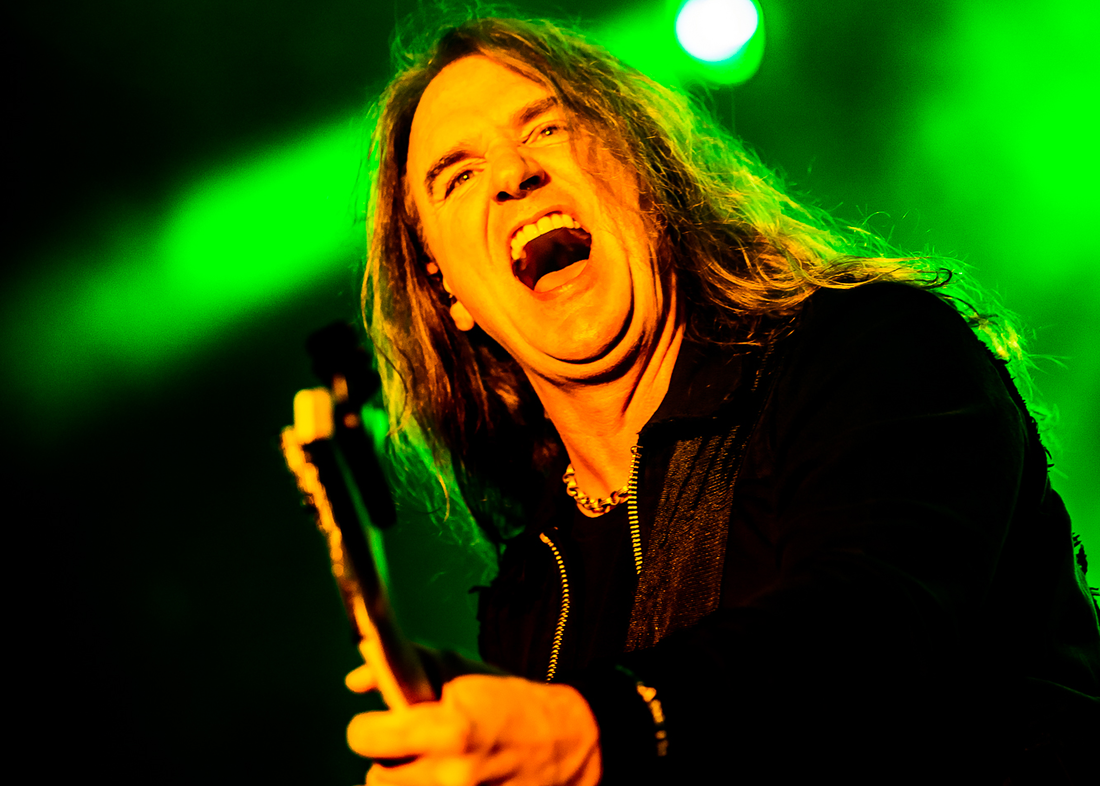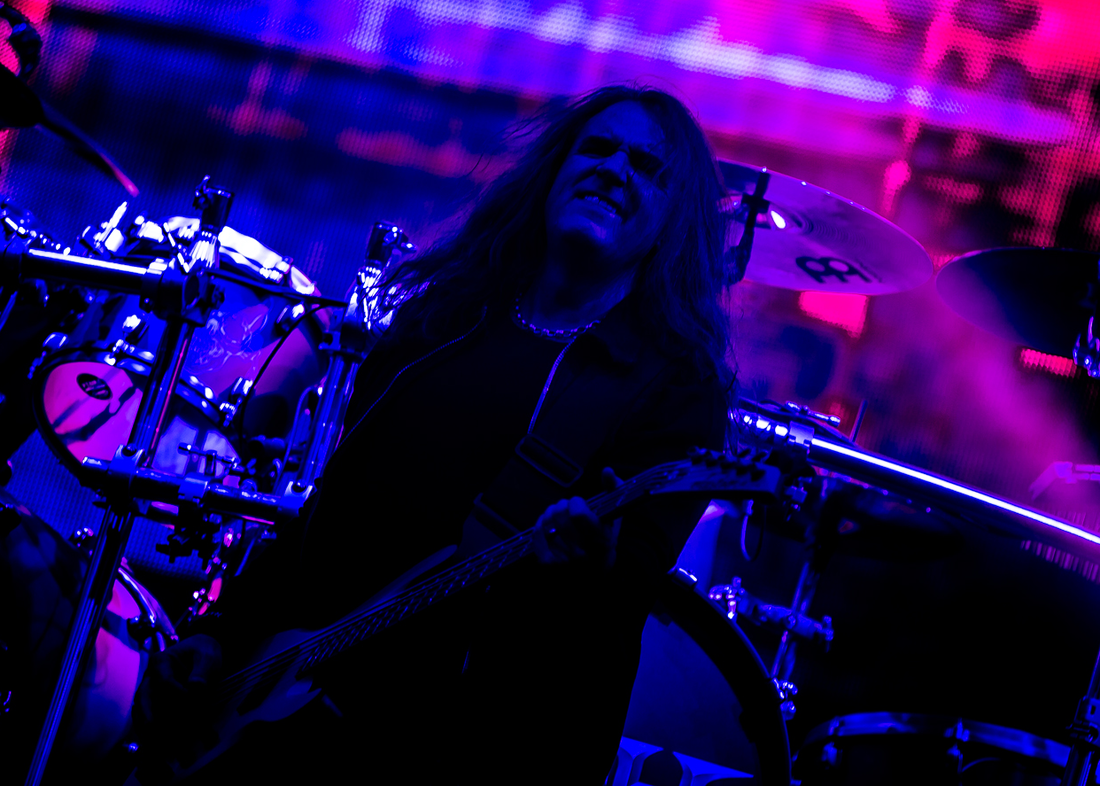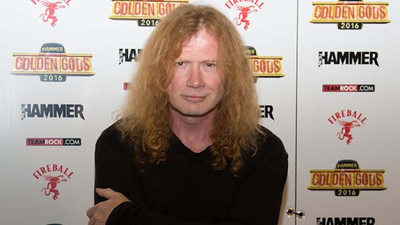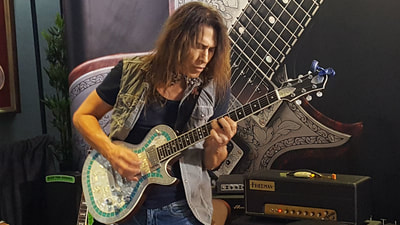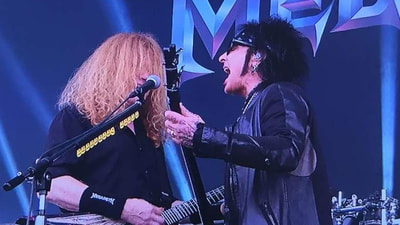|
Megadeth are genuine heavy metal royalty. Pioneering members of the Big Four, and a multi-million selling act, they’ve also weathered the storms of line-up changes, controversy and album misfires. Enjoying a renaissance with 2016’s ‘Dystopia’ – their highest charting release in over two decades - the band are now back on level footing once more. We sat down with founding bassist David Ellefson and “Megadeth veteran” guitarist Kiko Loureiro for a chat about all of the above. Rattling his goddamn head; Eamon O’Neill.
Hi Guys, how are you today?
David Ellefson: Good, yeah, doing great. We’ve been on tour for like, forever, it seems like. Kilo Loureiro: A year and a half. David Ellefson: Which is kind of cool, because you show up to a festival like Bloodstock, and we custom tailor the set list; we change it a little bit every night, and give it a kind of tweak. A lot of it’s just the feeling we have that day, but we know what we’re doing, and we’re ready to go. The last time I caught Megadeth live was at the beginning of the ‘Dystopia’ run; is there a big change between then and now? KL: It was the first tour, or the last dates of the first tour. I feel comfortable now with the fans, and with the band. How does it feel for you David, because obviously the band went through a great number of changes to get to this line up? DE: When we did ‘Dystopia’, Kiko was the newest member, and now Kiko’s not the newest member, still on the ‘Dystopia’ tour, you know what I mean? So Kiko already gets veteran status here! *laughing* With so many members having gone through the ranks, getting veteran status is kind of easy in Megadeth, isn’t it?! DE: *laughing* Well, you know, we’ve tried to stop that, but life happens. I think it was kind of a moment for me and Kiko as the drum change was happening, because we just came to this moment where Lamb Of God was just working, and Megadeth, we were starting our cycle, and we had to make this decision to officially get a drummer in the band. Chris [Adler] is our dear friend, and we loved playing with him, but there’s just a reality of that moment. And that was kind of a moment for me and Kiko, when we were working together on this drum transition when Dirk [Verbeuren] was coming in. So it’s kind of nice; I think Dave [Mustaine] looked to us a little bit, as sort of the anchor guys to help with that transition, musically. The transition came at time when Megadeth was enjoying your greatest success in years, with ‘Dystopia’.
DE: Well, it’s amazing how heavy the record is, and how popular is it, which is funny, because generally there’s this thinking that the more melodic and mainstream it is, the more popular it will be, and we’ve found that to not always be the case. I mean, it worked certainly on ‘Countdown To Extinction’ and ‘Youthanasia’, and even I think, ‘Cryptic Writings’; there was period, and I think a lot of that was fuelled by video networks, and American FM radio, but a lot of them have all gone away, pretty much. So you don’t have that pressure to be more commercial? DE: It’s nice for Megadeth to just be Megadeth, because it’s like music that we just like, and it fuckin’ rocks, and we like playing it. It’s nice to just make records like that, rather than second guessing yourself, because that becomes a real handicap when you either second guess yourself, or maybe there’s an outside party like a record label or a manager who says; “Well, why don’t we try to do this, and we can get bigger success”. That’s a really dangerous thing for an artist, to be led by; “There’s god in them there hills – you should go find it”. Never in my experience in Megadeth has that ever proven to be the right path. I think what you’re alluding to there, is the direction of ‘Super Collider’? DE: *Sighs* Yeah, and part of ‘Super Collider’ – much like the ‘Risk’ album, quite honestly – I think those are the two records in our discography that probably we took the biggest heat from the fans - I don’t think we were prepared enough, and I think there were tour dates booked, there was this demand for the band, and maybe rather than pushing that back to make sure the record was really there, those were probably a couple of records that got moved along a little faster than they probably should have. Do you think that ‘Risk’ is perhaps unfairly maligned? DE: Well, you know, lots of these things are mirrored by what came before, you know? ‘Countdown To Extinction’ coming after ‘Rust In Peace’ was a pretty organic transition, you know? I think ‘Risk’ coming out of ‘Cryptic Writings’, it just, you know, went too far for the fans, and I think the same thing happened with ‘Super Collider’. We were coming off of ‘Th1rt3en’, and that whole little era in there; ‘Endgame’ and ‘Th1rt3en’ and, and I think coming into ‘Super Collider’, it was just a little too hard of a turn. That was the period when you came back into the band after a long absence; did you miss it when you were gone?
DE: Yeah, of course I did, because I grew up in Megadeth. I mean, Dave and I started the thing, you know? So, I missed the brotherhood, and just the fun of doing it. At the same time, Dave had a different priority [when he put the band back together in 2004]; he was really wanting to make a solo record, and he’s spoken openly about this. So when it came together as what then became Megadeth, we weren’t as connected together; we weren’t as tight during that period, because the band essentially was disbanded. So, I think it kind of needed that season that it had. Dave got to, I think he needed to be back in control of Megadeth; I mean, he said it to me on the phone, we were talking before ‘The System Has Failed’, he goes; “We’re going to take the band back to when I was in charge, when I was the guy that ran it. We’re not going to let the manager and other people tell us what to do”. So I think Dave needed that season, for that to happen. You did keep yourself busy when you were out of the band, though. DE: I was busy with other things, other musical things as well as going to college. I was doing some artist relation stuff for Peavy, which I think, in a lot of ways, my nature is to be a friend of the community. I got networking to a lot of people and got to have new friendships outside of the bubble of being in a big rock band. It was good for both of us, so when it came back together in 2010, we came back not as Dave and David from the 90s, but as Dave and David of 2010; new men on our own two feet, really more solid in our own role in Megadeth, and I think that changed the course of where Megadeth went. I think when I came back, it was such a big thing because it was a uniting of two men, not two young guys. The band is in a great place right now; what’s coming next, is a new album on the horizon? DE: Well, after this, we wrap up the touring in November, at least for this year. I think Megadeth, we’re in a place now where there’s always going to be offers for shows, and I don’t think everything is going to be predicated on having to have a new album or there will never be another Megadeth show; we’re past that, we’re into a different season of our career now. At the same time, we want to continue to make new music and make new records, and we’ve found that with ‘Dystopia’, there’s a good synergy and chemistry to continue to make that happen. So there’s a confidence there about the next record, whenever and however that may be. But, we’re talking about it now, and I think we’re starting to get excited about getting into that creative head space together. Like this interview? Like us on Facebook and follow us on Twitter for regular updates & more of the same. Listen to this interview below, on the Neil Jones Rock Show on eonmusicRadio. |
|
Megadeth.
"When it came back together in 2010, we came back not as Dave and David from the 90s, but as Dave and David of 2010; new men on our own two feet." - David Ellefson.
© 2016 - 2024 eonmusic.co.ukContact: [email protected]
|

